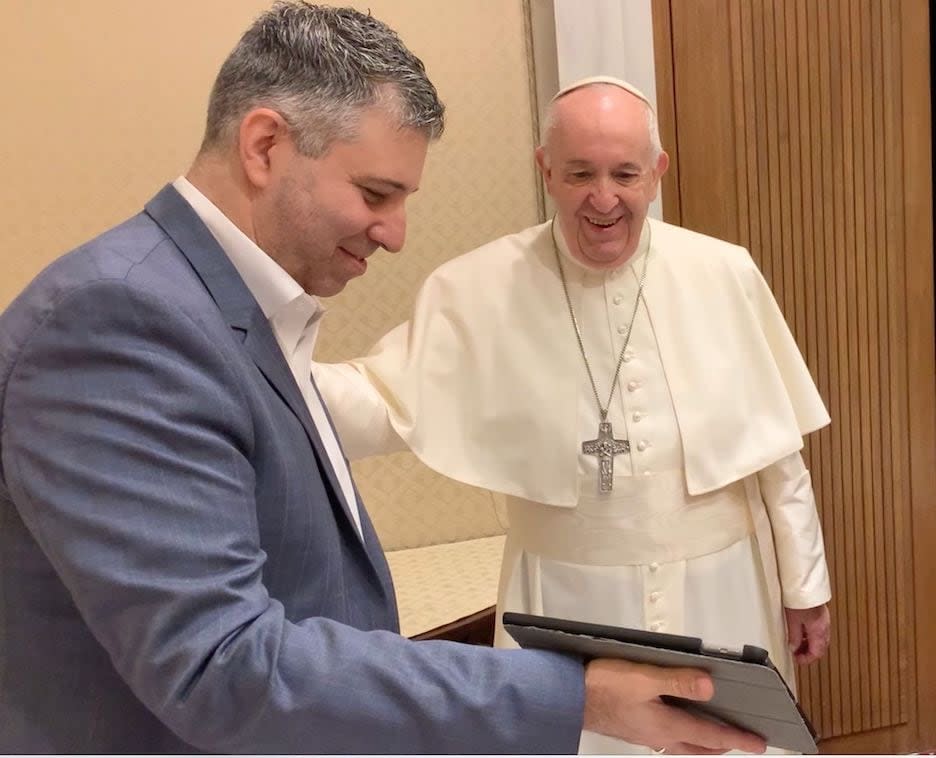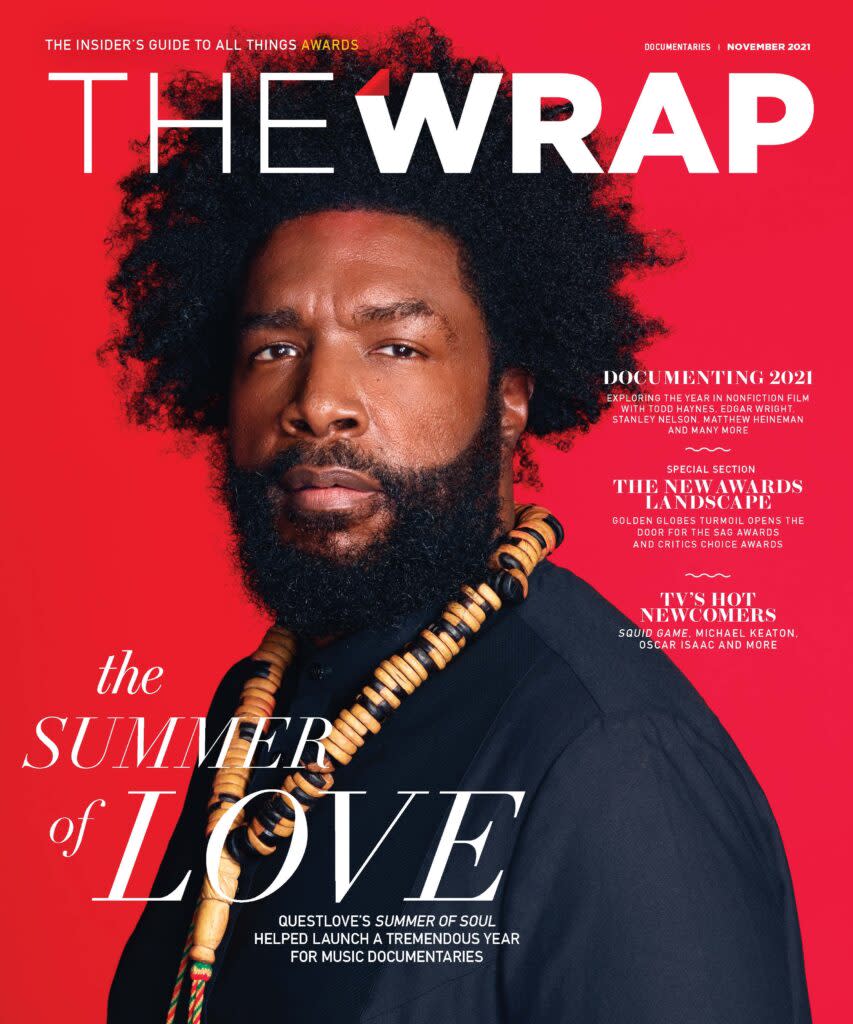How the Pope Francis Doc ‘Francesco’ Helped the Director Recover From Trauma
- Oops!Something went wrong.Please try again later.
- Oops!Something went wrong.Please try again later.
- Oops!Something went wrong.Please try again later.
A version of this story about Evgeny Afineevsky and “Francesco” first appeared in the Documentaries Issue of TheWrap’s awards magazine.
Russian-born director Evgeny Afineevsky’s last two movies, the Oscar-nominated “Winter on Fire: Ukraine’s Fight for Freedom” and “Cries From Syria,” documented the Ukrainian protests of 2013-2014 and the civil war that has torn Syria apart. “Francesco” takes an entirely different approach, following Pope Francis around the world and emphasizing his progressive side.
Afineevsky is not the obvious choice to direct a movie about the Pope: He grew up in a Russian-Jewish family in the Soviet Union, which at the time discouraged all religion. He later lived in Israel, where he served in the Israeli military before coming to the Los Angeles in 1999. (He now has U.S. and Israeli citizenship.) But after two movies about wrenching crises, he said he was ready for a different kind of film.
Was doing a movie about Pope Francis a conscious decision to move from trauma into healing?
Yeah. With “Winter on Fire,” I was affected by knowing people and them seeing them killed. That affected me, but not on the level of “Cries From Syria.” With “Syria,” I had pictures of kids wounded in gas attacks in Aleppo, and that affected me completely. I had a breakdown at the Sundance premiere after we opened “Syria,” and that was the start of trauma on the highest level. I was having nightmares, I was prescribed drugs that I didn’t want to take and I was lost.
“Syria” was the darkest side of today’s world. I wanted to find the positive side of humanity — and through the hope and positive side of Pope Francis, the nightmares disappeared. It changed me as a filmmaker, but it also gave me a more positive outlook in life.
What drew you to him?
I found he was standing for the plight of Syria. He was doing a lot on the refugee crisis. I loved his interfaith stance. I saw that he was working for the climate change talks. So for me, a lot of positive things that he was doing were like, OK, maybe this will give me a chance to express myself in a positive way, and not just bring horrible stories from around the world.
Wim Wenders did a movie in 2018, “Pope Francis: A Man of His Word,” based around his conversations with Pope Francis. How did you approach your film differently?
The Wim Wenders movie helped me understand many things when I saw it. I wanted to travel with him, to film him at work, and at first I didn’t know how much time I would get to talk to him. So I started with extensive research, which I love as a documentarian. I went to Buenos Aires in 2018 and I met with his family, with his close friends, with his neighbors from the places where he lived. I met the daughter of his former girlfriend and interviewed her because I wanted to understand him as the person who was in love with this girl. He loved tango, he loved going to the theater — it was important to understand the person he was before he became the Pope.
The film frequently uses the Pope’s tweets in a way that is a pointed rejoinder to the way Donald Trump was tweeting as president.
I wanted to show that there is a positive voice to Twitter, not just a negative one like we had in our country. If I put Francis making a statement on camera in my movie, I still need to put subtitles. So why should I not use his Twitter message instead? It’s finding positivity in Twitter messaging, because for those four years, we knew that it’s only negative, evil that comes through Twitter.

How do you manage your time and access to a man who is in such demand at every moment?
I felt that I wouldn’t have many chances to have conversations with him, but I knew that I could show him sequences from the movie. Since 1978, Pope Francis is not watching TV. As much as he loves the San Lorenzo team, his favorite Argentinian football team, he’s not watching them. He gets scores either by his secretaries or the Swiss Guards.
The only way I could show him something was by bringing my iPad and showing him bits and pieces of the movie, and then we would have discussions. And I also tried to as much as possible to be with him with people around, because that’s him — he enjoys being with the people, he doesn’t like to be isolated. As he says in the movie, that’s why he’s not living in the apostolic palace, because he wants interaction.
You traveled with him to many different places around the world over a number of years. Were there sequences you wanted to include but you just didn’t have room?
Oh, I had a different cut before the pandemic. And there was a sequence where I take the audience into the streets of Rome, where Francis meets a 7-year-old child whose father had just died. The father was an atheist, but the child was raised as a Catholic, and his schoolteacher repeatedly said to the entire class, “Everybody who is not a believer goes to hell.” So the child literally asked this question of the Pope on the street, and Francis’ explanation was amazing. He said, “No, your father will be close to God because he did a good thing. He raised a great child. You cared about your father, and you’re a good boy. How could somebody who raised such a good child go to hell? Of course he will go to heaven.”
When it first premiered, the film got a lot of attention because in it, Pope Francis came out in support of civil unions for gay people, saying, “Homosexual people are children of God and have a right to be in a family.”
That was strange, because he always endorsed this. He was endorsing civil union laws as a cardinal, and I know he said it to at least four journalists before me. But I guess that as documentary filmmakers, we take historical facts and merge them with images, and the combination of the image and the statement makes them even more impactful. That’s probably the effect of my interview.
It must have also struck a chord with you, as a gay man who recently became a father.
You know what? I went into this movie thinking it would not relate to me, but in a lot of ways it did relate to me. The project of becoming a father started in 2019, with my ex-boyfriend, who is super-Catholic. And this project reshaped me personally, it stopped the nightmares and it and inspired me to have a family.
When I finished the movie and I showed parts of it to him last year, he said, “Evgeny, thank you for patience.” And I think one of the lessons that I learned from him is patience, which is helpful for me being a dad because you can’t raise a child without this patience — especially a newborn. Many beautiful qualities were developed through this journey. I’m thankful because it’s changed me. It changed my life. It gave me more desire to create because I have a little one. It’s allowed me to become who I am these days.
Read more from the Documentaries Issue here.


